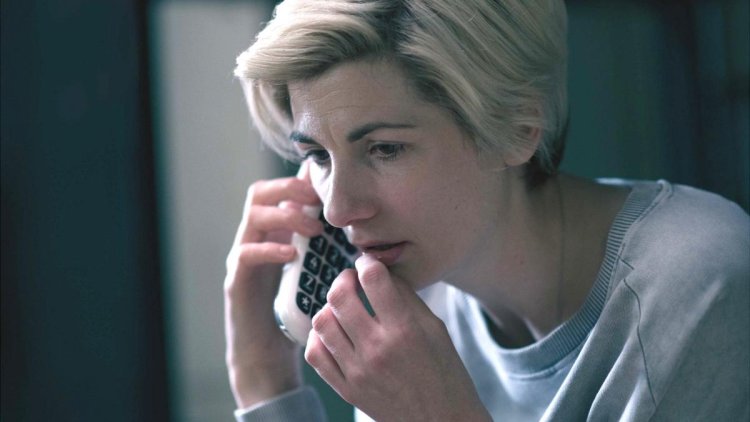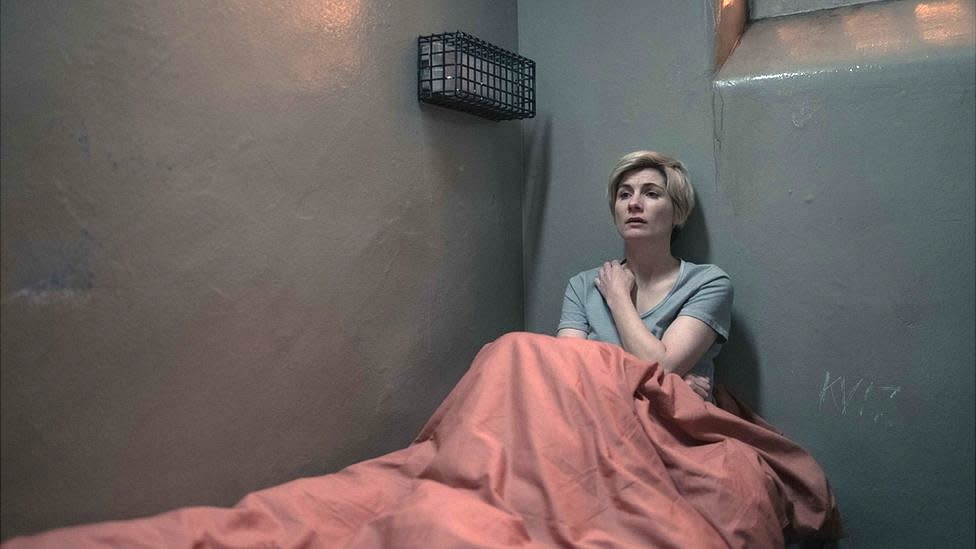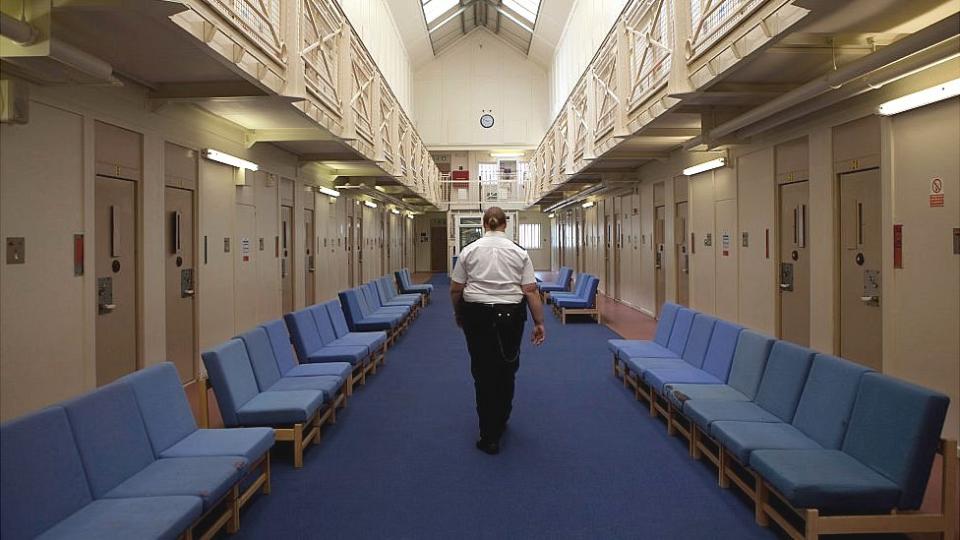Time: Short prison sentence 'derailed' woman's life
In the BBC One series, Orla, played by Jodie Whittaker, loses custody of her children as a result of a short prison sentenceThe impact of short prison sentences on women and their families is a central theme of the latest BBC One prison drama Time. One woman - jailed for stealing in her early 30s - says the four months she spent behind bars "totally derailed" her life."I often think about how life might have been different without going to prison," says Martha, who is using a pseudonym."I don't think purely punishing someone and re-traumatising them helps them to move on with their lives."Martha was jailed in 2016 after committing "petty and pathetic crimes" to fund her heroin use - stealing a car jack from a garage, some artificial flowers from a front garden and a purse containing £3 - close to her home in County Durham. She had previously received a few cautions for shoplifting but had no convictions for violence.She acknowledges that all crimes have a negative impact on victims. "I


The impact of short prison sentences on women and their families is a central theme of the latest BBC One prison drama Time. One woman - jailed for stealing in her early 30s - says the four months she spent behind bars "totally derailed" her life.
"I often think about how life might have been different without going to prison," says Martha, who is using a pseudonym.
"I don't think purely punishing someone and re-traumatising them helps them to move on with their lives."
Martha was jailed in 2016 after committing "petty and pathetic crimes" to fund her heroin use - stealing a car jack from a garage, some artificial flowers from a front garden and a purse containing £3 - close to her home in County Durham. She had previously received a few cautions for shoplifting but had no convictions for violence.
She acknowledges that all crimes have a negative impact on victims. "It was awful to walk into someone's house like that, I don't want to take away from the severity of doing that," she says.
But with scant focus on rehabilitation and very little support, Martha says life after prison was even more isolating and unmanageable than it had been before.
"I ended up in another toxic, damaging relationship, lost hope of gainful employment and life got exponentially worse," she says. "Prison left me feeling really awful about myself. I told myself I was just a scummy junkie who didn't deserve good things."
'A punishment which bites deep'
The first series of Time, starring Sean Bean and Stephen Graham, won multiple Bafta awards with its portrayal of men navigating the penal system and their consciences. In the second series, the writers wanted to focus on the experiences of women.
Helen Black, who co-wrote the drama with Jimmy McGovern, says giving women short sentences for non violent crimes is "a terrible idea".
"They're long enough to ruin lives and cause chaos in the prison estate but not long enough to act as a deterrent or offer up the chance of rehabilitation," she says.
In the series, her sentiments are played out through a fictional single mum of three called Orla, played by Jodie Whittaker. She tampers with her electricity meter to cut costs and, because of aggravating factors in her case, is sent down for six months, losing her children, home and job as a result.
Her situation reflects the fact that the majority of women sent to prison in England and Wales last year were handed sentences of six months or less, according to the Prison Reform Trust. Non-violent crimes like shoplifting were the most frequent offence.
Paula Harriott, who works for the charity and has been to prison herself, says she consistently sees female prisoners ending up in Orla's situation.
She says the sentences are intended only as a punishment - but they "bite deep".
"Prison should be reserved for the gravest of crimes, for women who are a danger to society," she says.
The charity wants to see the government put more money into helping women serve sentences in the community, rather than on plans to build 500 more cells inside women's prisons.
It argues that community sentences are a better alternative because they allow women to maintain their family ties, hold on to their jobs and look after their children - all factors which, it says, reduce the risk of reoffending.
Abuse and self-harm
Martha's background reflects the profile of many women in prison.
She had been a heroin user for more than a decade by the time she went to jail, and in a violent relationship with the man who had first introduced her to the drug. Part of the reason she stole was to fund his drug habit.


Like many women in prison, Martha also had a long history of mental health issues and self-harm. As of 3 November, there were 3,596 women in England and Wales doing time, compared to 84,168 men.
According to data from the Prison Reform Trust and charity Women in Prison:
Nearly 60% of women who offend are domestic abuse survivors
Over half of women in prison experienced abuse during childhood
Over a third of women in prison were in care as children
40% of women declare they have a problem with drugs and alcohol on arrival to prison
Martha believes it would have been better if the judge had sent her to a drug rehabilitation centre, because she quickly fell back into an even worse version of her old life when she was released on probation.
She did receive some basic drug counselling while serving her sentence, but there wasn't long enough to do much more than that, she says.
"I went from a domestic violence, drug-using environment which was stressful and scary into another stressful and scary place, where violence would break out around me," she says.
Prison put a strain on already frayed relationships with her family and she lost access to her welfare benefits, causing problems when she was released.
People are given a prison discharge grant when they are released, which amounts to £82.39 - the first thing she did with that money was go and buy heroin.
This was because she says she knew she wouldn't be able to last the several days it would take to get an appointment to sort out a prescription of methadone, the legal heroin substitute doctors prescribe to ease the worst of withdrawal symptoms.
Things took an even darker turn when Martha missed a probation appointment and was sent back inside for a week to serve the remainder of her sentence.
'Vital community support'
The government's own analysis links prison sentences of under a year with higher levels of reoffending, when compared to types of sentences served in the community. It says prison costs £47,000 per prisoner, per year.
On 7 November, a change of approach to sentencing was announced in the King's Speech. It said the government would legislate to ensure men and women sentenced to less than a year in prison would serve sentences in the community, to address concerns over overcrowded jails and the reoffending rate.


Time is available to watch on BBC iPlayer now.


The Prison Reform Trust welcomes the change but warns that investment in probation and community support will be "vital".
It would like to see more investment in women's centres across the country, to help women address the root causes behind their crimes.
These centres help women find employment and housing - and also offer mental health therapy, counselling and other support to address trauma and overcome addiction. Some of them are residential and accommodate children too.
But the charity points out that a lack of adequate, secure funding can deter judges from offering non-custodial sentences.
A Ministry of Justice spokesperson told the BBC that "custody is always a last resort for women" and the number of female prisoners has fallen since 2010.
"Since 2018, we have invested around £60m into organisations that support female offenders outside of prison and have a wide-ranging programme of work alongside that to help them turn their backs on crime."
"In May, we awarded 40 women's centres and charities up to £15m to run services until 2025 that support women in or at risk of contact with the criminal justice system living in the community."
Meanwhile, Martha has managed to slowly regain control over her life and has been in recovery from heroin for three years.
"My life is peaceful in comparison to how it was, but I still struggle and support for people like me is extremely limited," she says. She volunteers at her local drug and alcohol service to offer the kind of peer support she thinks she would have benefitted from.
"I was a frightened, emotionally unsupported young person who took a wrong turn in life and suffered the harshest consequences."
What's Your Reaction?

















